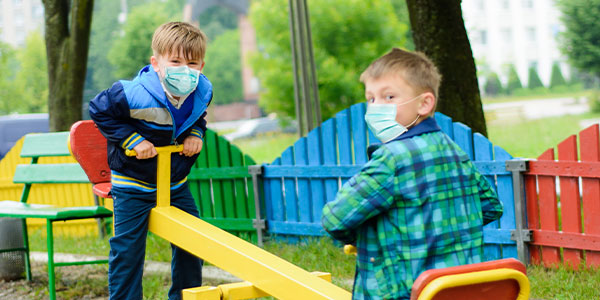5 Ways to Help Your Kids Have a Healthy School Year
5 Ways to Help Your Kids Have a Healthy School Year

With kids heading back to school, here are some ways you can help stay healthy, happy and thrive.
1. Prioritize the basics: sleep, exercise & nutrition
Begin with the basics, ensuring that students get nutritious meals, sufficient sleep and physical activity. All of these are key to academic and social success. Studies show that children who eat a nutritious breakfast function better at school, for example. Many children qualify for free or reduced-price food at school, including breakfast. The forms for these services can be completed at the school office.
Getting enough sleep is also critical to staying healthy and thriving at school. Not getting enough sleep can affect memory, concentration, creativity and learning. In fact, lack of sleep is linked with lower academic performance, school attendance and tardiness.
2. Stay up to date on checkups & immunizations
If your child has not had a well-child checkup in the last year, schedule a back-to-school physical which will include any needed vaccinations. If they will be playing a sport, be sure to get a pre-participation (sports) exam. Your pediatrician can help you update any forms your child's school may need in case of a medical emergency.
If you have health insurance coverage through Medicaid or the Children's Health Insurance Program (CHIP), check that your contact information is up to date with your state Medicaid agency. This will ensure you get timely updates about your health coverage so you can avoid any gaps in coverage.
3. Tune in to your child's mental health
Many children and teens have experienced mental health struggles over the past few years. Let your child know it's OK to talk about how they're feeling, and make it safe for them to discuss tough issues with you. Kids often avoid talking about touchy subjects, especially if they expect to be judged, lectured or punished. If you haven't already made this clear, affirm that your child can tell you anything. Emphasize that these conversations will take place in a judgment-free zone and really listen to what your child is saying.
Stay on the lookout for any changes in behavior that worry you or any signs of anxiety, depression or distress. If you have a firearm in your home, make sure to lock it up and store the ammunition separately. The increased risk of suicide is higher for children and teens who live in a home where guns are stored loaded or unlocked.
Try to prioritize family meals and self-care breaks, like taking walks together. These can be great opportunities to talk. Ask your pediatrician if you are unsure if your child needs help or how to start a discussion. Schools may also offer sources of mental health support.
4. Talk about racism, bullying & kindness
Talk with your child about racism and hate. Encourage children to seek help from a trusted adult if they are discriminated against or witness an act of bullying or discrimination against others. Emphasize the value of treating others with respect and how simple acts of kindness can make a big difference. In fact, research shows that kindness can reduce stress and offer health benefits for everyone.
5. Plan for mindful media use
The change in routine is a good time to create or update your family media plan so you can help your child balance screen time with sleep, exercise and other healthy activities. Help your children choose high-quality programs or games and help them recognize sites that that promote false information.
This is also a good time to engage in conversations with your child about if and how they use social media, which can be beneficial but also problematic for some. We are still learning about the ways social media can affect human health, especially among children and teens. (See "Social Media & Mental Health.")
Remember
Children are resilient and can overcome many challenges with the help of trusted adults around them. Talk with your pediatrician if you have any questions or concerns about your child, including changes in mental or behavioral health. Look for any notable changes in sleep, weight, eating habits or other everyday patterns. Your pediatrician is here to help!


































